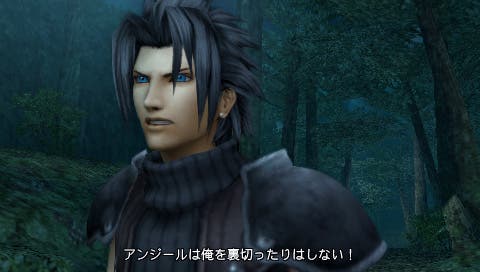Crisis Core Final Fantasy VII
Zack attack.
Final Fantasy games traditionally focus their story on themes of identity, where the characters, oftentimes orphans, slowly uncover who they are and what they're living for. We ask Tabate if this is the case with Crisis Core. "We absolutely did not want to take that thematic route with this game," he answers. "Zack is not trying to find out who he is. This game is a lot more about themes of pride and will and explores how the characters carry that out in the situations they are placed in. That said, to maintain consistency with the rest of the Final Fantasy VII mythology, Yoshinori Kitase has worked as a producer on the project alongside Tetsuya Nomura to ensure oversee the scenario and ensure that everything hangs together perfectly."
Crisis Core was one of the first games to be announced for Sony's PSP system. We quiz Tabate as to why it's taken so long to get to this stage. "We spent a lot of time scoping out what we wanted the technical level of achievement to be. Then it was a case of gathering a talented team comprised of as many creative members who worked on Final Fantasy VII as possible. By last year the team was large enough to produce the images that were revealed at E3 and we began the main drive of work."
"One of the biggest challenges has been to provide an experience deep enough for hardcore players but accessible enough to causal gamers. To help with this we developed two battle systems which run alongside each other simultaneously - one action and one menu based - to appeal to both types of players."
Having played a short level in the game we can confirm that the system appears to work well, although we wouldn't agree that it's quite as pick-up-and-play as Tabate would have us believe. The real time battles, soundtracked by the original game's recognisable music, give the player complete control over Zack in the field. In the demo we played, the L and R triggers switched his main action between his sword, items and fire, lightening and healing Materia with the circle button executing the command.

Facing multiple enemies, of whom the nearest is automatically targeted, the action was fast-paced and frenetic with short pauses interjected by blocking and dodging moves. Over the top of this orthodox action-game system is laid Crisis Core's primary invention, the Digital Mind Wave system. We didn't play the game for quite long enough to work out exactly how the system worked but, in essence, three character slots rotated in the top left hand corner of the screen, fruit machine style, occasionally aligning with each other and triggering a Limit Break style move dubbed a ‘Power Surge'.
Tabate was confident about the core mechanics explaining: "We've managed to create a system which accommodates lots of play styles by giving players more control over their character to enable emphasis on either technical or action orientated play. We're so confident that the game will be easy to pick up that we haven't included a tutorial level. We've found that casual players seem to use just one type of move while hardcore players string together complex combinations."
Visually the game is stunning setting a new high point for PSP work. The cut scenes we watched were handled with typical Square-Enix flair and visual bombast showcasing stunning animation work. But this cutting edge finesse was dulled with the reoccurrence of random battles during the exploratory sections, which will irk many modern players. It's difficult to know quite what to think of the game, even at this late stage, Technically brilliant and thematically interesting, the melange of a battle system, upon which the game's success will ultimately rest, did not click in the time we spent with it. Whether it's over-simplified or over-complex remains to be seen but, as the game comes in to land, it still bristles with the same indistinct confidence and potential it has done for three years now.
Crisis Core Final Fantasy VII will be released in Japan on September 13th, 2007. It's Western release in all territories is TBA.

